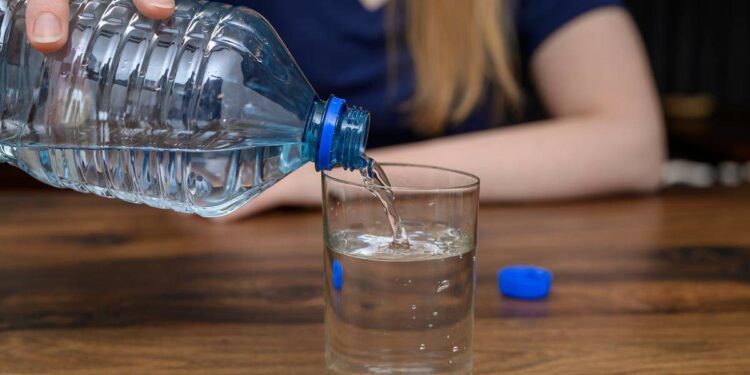Bottled water sold in Luxembourg contains forever chemicals, a study by an environmental campaign group has found, after earlier research had also found the pollutants in tap water.
A sample of bottled mineral water from Luxembourg – provided by local environmental group Mouvement écologique – showed levels of Trifluoroacetic acid (TFA), a long-lasting pollutant.
TFA is contaminating all drinking water in Europe, from groundwaters to rivers and bottled mineral water, and Luxembourg is not spared, according to the latest study published this month by Pesticide Action Network Europe (PAN Europe).
PFAS – per-and polyfluoroalkyl substances – also referred to as forever chemicals – are long-lasting molecules which break down very slowly over time.
Forever chemicals come from various sources, like pesticides used in agriculture or cooling gases. Other sources include used water treatment plants and industrial pollution.
The latest study found that 23 surface water samples and six groundwater samples were contaminated by PFAS, with concentrations ranging from 370 nanograms per litre (ng/L) to 3,300 ng/L, with an average of 1,180 ng/L.
While the organisation found other PFAS in the samples, TFA was found in much higher concentrations and accounted for more than 98% of all pollutants detected.
Present in Luxembourg
In Luxembourg, TFA is also present both in surface water – its concentration in the Alzette exceeds 1,200 ng/l – and in groundwater, with more than 900 ng/L for all the country’s groundwater, as the organisation revealed in a series of studies published between May and December.
Back in July, the environment ministry insisted Luxembourg’s drinking water remained safe for consumption, after a PAN study found pollutants in a sample in the country.
Also read:Drinking water still safe despite pollutants, says government
At the start of the month, PAN Europe detailed its latest analysis, which looked at bottled water. It revealed that Villers natural mineral water – sourced in Wallonia and sold all over Belgium, had the highest concentration of TFA (3,400ng/L), followed by Vittel, sourced in France (400ng/L).
A sample of bottled mineral water from Luxembourg revealed TFA levels of 430ng/L.
Unknown source
Though Luxembourg’s sample also presented traces of TFA, PAN Europe did not reveal the name of the producer that bottles and sells this water, at the request of Mouvement écologique.
“The Luxembourg brand concerned has been anonymised given the limited number of mineral water producers in Luxembourg,” the report stated, explaining that “disclosure of the brand name could focus excessive attention on this single manufacturer, instead of highlighting the overall problem.”
“It is worrying to note that it has now been clearly established that bottled mineral water is also contaminated by forever chemicals”, said the Mouvement écologique following the publication of the report.
A sample of the Alzette near Mersch showed a TFA value of 1,220 nanograms per litre. The proposed limit value under an EU directive is 500 nanograms per litre © Photo credit: Marc Wilwert
“This is all the more problematic because consumers assume that this is a ‘natural’ and ‘pure’ product,” the organisation said.
Scarce data to assess the risks
The issue with the prevalent molecule is that “there is currently no legal limit in the EU for TFA” in water sources, PAN Europe said.
Also read:Study finds Luxembourg’s waters contaminated with toxic chemicals
As the organisation pointed out, TFA is problematic as there are insufficient studies of its impact on human health. Recent studies, however, have demonstrated that it had similar harmful effects as other PFAS on liver and reproductive health.
“There are surprisingly few toxicological studies despite its widespread presence,” said PAN Europe.
“On the basis of current scientific knowledge of the toxicity of this chemical, the levels of TFA that we have found still appear to be within safety limits,” the network said.
The Dutch public health institute RIVM set the limit at which humans can consume the chemical without health consequences at 2200ng/L. The lack of data on the toxicity of TFA means that “an underestimation of the risk cannot be excluded,” the institute said, something which the PAN report also stated.
“The argument that short-chain PFASs (such as TFA) are harmless” is now “increasingly challenged by current scientific evidence”, the report said, citing two recent studies on the toxicity of TFA, which “show effects similar to those of better-studied and better-known PFAS (liver toxicity and congenital malformations)”.
Towards a legal limit
There is currently no legal limit in the EU for TFA in surface water, groundwater or drinking water. PAN Europe is therefore calling for an “immediate ban on PFAS-based pesticides” and for the “establishment of an EU drinking water safety limit for TFA”.
The European Commission took up the issue at the beginning of December, proposing a ban on certain pesticides because of TFA pollution.
A standard limit value for ‘Total PFAS’ of 500 ng/L in drinking water could come into force in the EU in 2026. But will TFA be included?
“Discussions are still underway to determine how, and even if, this will be the case,” said PAN Europe.
For its part, the Luxembourg government says it “actively supports initiatives at European level aimed at restricting the manufacture, marketing and use of PFASs, including TFA”, and “also advocates harmonised European limit values for TFA”.
TFA levels have been monitored in the country’s drinking water sources since 2023, and first analyses have shown levels of TFA reaching up to 900ng/L, Luxembourg’s environment ministry said in July.
(This article was first published by Virgule. Translation, editing and adaptation by Tracy Heindrichs)
Source link : http://www.bing.com/news/apiclick.aspx?ref=FexRss&aid=&tid=676abddd96fe41ce9aa1b797677f3162&url=https%3A%2F%2Fwww.luxtimes.lu%2Fluxembourg%2Fforever-chemicals-found-in-bottled-water-in-luxembourg%2F31102965.html&c=15527927624110596503&mkt=en-us
Author :
Publish date : 2024-12-23 04:30:00
Copyright for syndicated content belongs to the linked Source.


